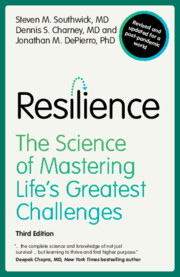Book contents
- Reviews
- Resilience
- Resılience
- Copyright page
- Contents
- Acknowledgments
- 1 What Is Resilience?
- 2 Optimism Belief in a Brighter Future
- 3 Face Your Fears
- 4 Moral Compass
- 5 Religion and Spirituality
- 6 Social Support
- 7 Role Models
- 8 Mind Your Body
- 9 Challenge Your Mind
- 10 Cognitive and Emotional Flexibility
- 11 Meaning, Purpose, and Growth
- 12 The Practice of Resilience
- Resilience Facing Death: A Tribute to Dr. Steven M. Southwick
- Abbreviations
- References
- Index
7 - Role Models
Published online by Cambridge University Press: 01 August 2023
- Reviews
- Resilience
- Resılience
- Copyright page
- Contents
- Acknowledgments
- 1 What Is Resilience?
- 2 Optimism Belief in a Brighter Future
- 3 Face Your Fears
- 4 Moral Compass
- 5 Religion and Spirituality
- 6 Social Support
- 7 Role Models
- 8 Mind Your Body
- 9 Challenge Your Mind
- 10 Cognitive and Emotional Flexibility
- 11 Meaning, Purpose, and Growth
- 12 The Practice of Resilience
- Resilience Facing Death: A Tribute to Dr. Steven M. Southwick
- Abbreviations
- References
- Index
Summary
When we face challenging times, we think about people who have been there before and what they did that worked. We turn to role models, who can be found in many places, including our family, friendship group, educational and faith setting, or from history more broadly. We may have physical reminders around us, such as awards or photographs, of the resilience of generations of family members. The neuroscientific research that we describe in this chapter has helped us to understand how we observe and practice how our role models think, feel, and act. In this chapter we share ways to seek out and utilize role models so you can maximize their benefits.
- Type
- Chapter
- Information
- ResilienceThe Science of Mastering Life's Greatest Challenges, pp. 123 - 140Publisher: Cambridge University PressPrint publication year: 2023

